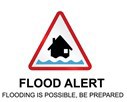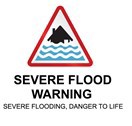Flood advice
Are you at risk of flooding?
How can I tell if flooding is likely?
The Environment Agency and The Met Office offer free flood warning updates:
The Environment Agency also offer a service that allows you to check the long term flood risk for your area:
Types of flood alerts
Flood alerts are mostly linked to fluvial flooding, it can be difficult for agencies to predict flooding for surface water.
 |
Flooding is possible and you should be prepared. This warning is typically given anywhere between two days to two hours before a flooding event. |
 |
Flooding is expected and immediate action is required. This warning is typically used within half an hour to one day in advance of flooding. |
 |
Severe flooding, there is a significant risk to life and disruption to communities. |
Flood alerts are mostly linked to fluvial flooding, it can be difficult for agencies to predict flooding for surface water.
Key contacts
During a flooding event, if you are vulnerable or feel that lives are at risk, contact the emergency services on 999 for immediate assistance and rescue.
If the issue is urgent but not life threatening, contact us by phone on 0208 554 5000
- Environment Agency hotline on 0800 80 70 60
- Call Thames Water on 0800 316 9800
- Call your Water Utility, to find out who your water company is you can check with Water UK
Some key contact details you should have:
- Your landlord
- NHS 111
- Numbers of family and friends
- Insurance company claim line (keep your policy number to hand)
- Flood line - 0345 988 1188 (charges may apply)
- Thames Water - 0845 9200 800
- Environment Agency Floodline - 0345 988 188
- National Grid - 0800 111 999
- EDF Energy - 0800 111 999
- UK Power Networks - 051
What to do before a flood
- Find out if your property is at risk by checking UK's flood maps
- If you are at risk from river or tidal flooding or in some specific areas affected by groundwater, sign up for the UK's flood warning service or call Floodline on 0345 988 1188
- Sign up to UK's flood warnings and the Met Office weather warnings
- Read UK's advice on preparing for a flood
- Read the National Flood Forum's advice on preparing for a flood
- Read the London Fire Brigade flooding webpages.
- Visit the Greater London Authorities flash flooding webpage for more advice
- Have a flood kit and make a flood plan, you can use UK's template flood plan
- Check your buildings and contents insurance policy to make sure you're covered for flooding and that you've not underestimated the value of your home contents
- Know how to turn off the water, gas, and electricity, ask your supplier for advice if you're not sure, put stickers on the taps so you can see them easily
- Plan what you will do with pets, cars, furniture, electrical equipment, and garden furniture and other high value items
- Make a personal, community or a business flood plan
- Meet with neighbours and make a community flood plan
- Check the weather regularly
What to do during a flood
If there is a risk to life, a serious risk to property or the environment call 999
During a flood you should:
- keep up to date about the weather and risks to your property using radio, TV, web, or social media
- keep outside drains clear to let surface water escape
- turn off gas, electricity and water supplies before flood water enters your property (if it's safe to do so)
- put plugs in sinks and baths and weigh them down to stop water overflowing into your home
- wash your hands whenever they come into contact with flood water as they may be contaminated
- look after your neighbours - even in the summer, people can suffer from hypothermia after their homes have become flooded with cold rainwater
- be careful if you have a private water supply - flooding can affect its quality and damage equipment, boil it before drinking or using it for food preparation
- if your home has been flooded, move your family and pets upstairs, or to a high place with a means of escape, take your emergency grab bag with you
- if you're using a petrol or diesel water pump, put the generator outside, keep your doors and windows closed, use a carbon monoxide detector in your home - generators produce carbon monoxide fumes which can kill
- evacuate if told to do so by emergency or council officials
During a flood you should not:
- touch sources of electricity when standing in flood water
- enter your home if there is raw sewage in it - stay somewhere else until it has been cleaned
- smoke, eat or drink whilst in contact with flood water (always wash your hands in clean water before doing so)
- let your children play in flood water, it can become contaminated with sewage and chemicals
- use towpaths
- walk through flooded areas - even shallow water moving fast can sweep you off your feet, there may be hidden dangers such as open drains, damaged road surfaces, submerged debris or deep channels - these can cause serious injuries or even death
- travel in heavy rainstorms unless absolutely necessary
- drive through flooded roads or areas:
- 80 percent of flood deaths happen in vehicles as the water is deeper than it looks and moving fast
- your vehicle may be swept away, or you may become stranded, four inches of water is enough to stop a car
- driving through flood water can spread sewage onto your car and into streets
What to do after a flood
We'll do our best to reduce flooding but if it does happen, we'll:
- help restore the flooded area to normality
- provide support to those affected by flooding
- consider how we can prevent future flooding and reduce its effect
- work with government departments and partner agencies, hoping to secure funding and grants for those affected
- For significant events the Local Authorities are likely to have a recovery plan which will be enacted
What to do after a flood, once the water has receded:
- contact your insurer as soon as possible after a flood, there is information available on insurance guidance for homeowners
- begin clear up once it is safe to do so, read UK's advice on clearing up after a flood for more advice
- wear protective clothing such as wellies and rubber gloves before starting any clean up
- remove dirty water and silt from your property
- if you have wooden floors you may have water under the floorboards which need pumping out. Emergency services do not provide a pumping-out service, so you'll need to get pumps from hardware and DIY stores
- if using a petrol or diesel pump make sure the generator is outside and that doors and windows are closed - generators produce carbon monoxide fumes which can kill
- ventilate your property, open doors and windows - less damp means less damage
- use specialist detergents to clean up oil and petrol, following the manufacturer’s guidelines, and ensure the area is well ventilated
- don’t dispose of damaged goods until your insurers have had a chance to inspect them
- flood water can leave a muddy deposit containing bacteria but a thorough clean up reduces the health risk
- get your local electricity supply checked before switching it back on. (For businesses, assess the risk to your staff and customers and consider closing the business until it has been checked).
- don't use electrical equipment exposed to flood water until it has been checked by a qualified electrician
- do not use internal lifts until power is back to normal
- have your gas or oil central heating checked by a qualified person
- follow the Food Standards Agency's advice on food safety after a flood
- get professional advice (structural engineer) for repairs if your property is damaged
- if anyone becomes ill after accidentally swallowing flood water or mud, contact a doctor and tell them about the flooding
- report your flood to the relevant body to ensure they take action where necessary using the key contacts above, and it is included in future decision making on projects that may be taken forward.
- apply for any assistance provided by central government and/or the local authority

